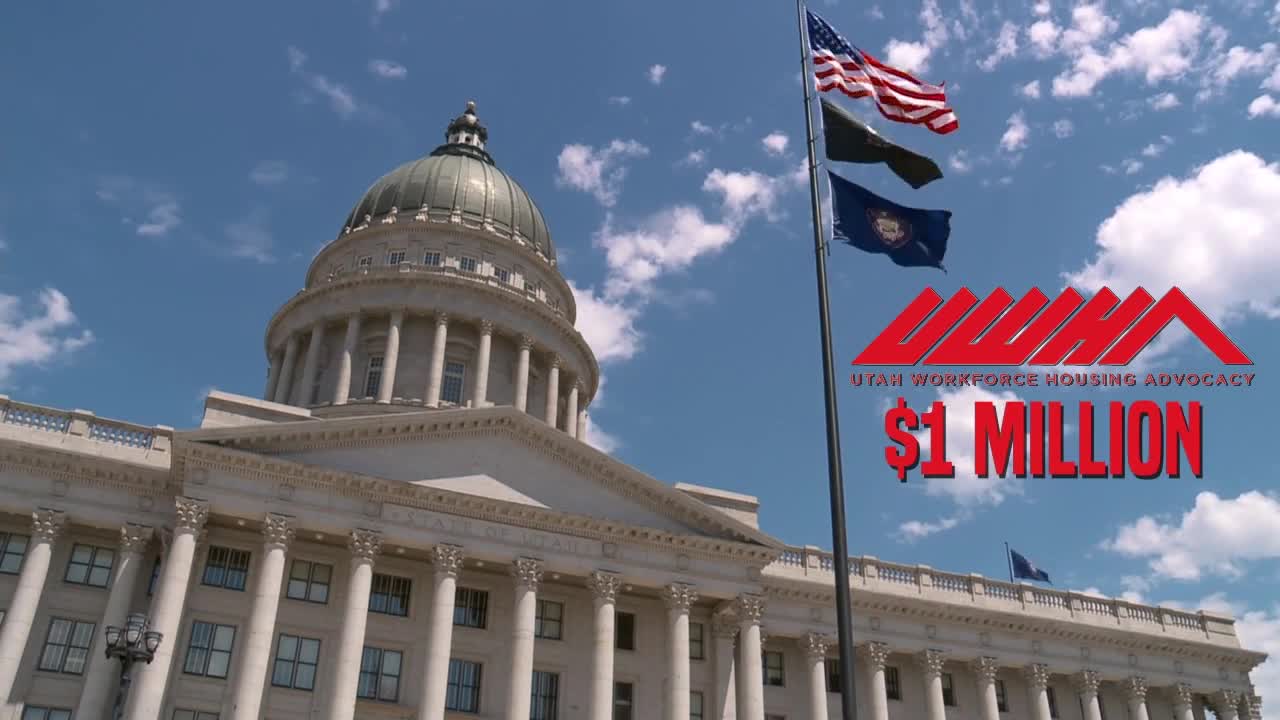CLINTON, Utah — The ads show children playing a form of musical chairs. The last two kids miss their chance for a cardboard house.
“See how you can help to make homes more affordable at DemandMoreSupply.com,” the narrator says in the final line.
The campaign is the product of an organization called Utah Workforce Housing Advocacy (UWHA). The Utah Legislature has given it $2 million for the Demand More Supply campaign and recommendations aimed at addressing Utah’s lack of housing, particularly housing people can afford.
UWHA did not have to compete against any other bidders to receive the money. One resident in Clinton, who is fighting a proposed development there, referred to the Demand More Supply’s messaging as “propaganda.”
Matt Lusty, UWHA’s executive director, said in an interview with FOX 13 News that the campaign was conceived by people who were discussing the issues Utah is facing.
“We felt like the most important issue right now is housing affordability,” Lusty said.
But Utahns FOX 13 News spoke to on Gallivan Plaza say they’re well aware that Utah is facing a housing affordability crisis and believe tax money could have been spent on more tangible efforts to alleviate that shortage.
“I think we’ve been hearing for years there’s low inventory and that’s driving up demand,” Utahn Ryan Dent said after watching one of the campaign’s videos.
‘Increasing housing units’
UWHA’s initial funding request, filed by Sen. Dan McCay, R-Riverton, said, “The target audience is the people of Utah to understand and appreciate efforts to supply housing for first-time home buyers and members of the workforce with incomes at or below median levels.
“This could be done by increasing housing units for sale and rent at all price points.”
Lusty had a different description of UWHA’s early work.
“We went into the creation of Utah Workforce Housing Advocacy knowing that housing affordability was a problem,” Lusty told FOX 13 News, “but we did not initially think, ‘Oh, this is just a supply issue.’”
The written recommendations or solutions from UWHA and the Demand More Supply campaign focus on the supply side, including changing zoning laws, providing tax incentives and “prioritizing surplus public land for housing.”
One recommendation says to expect arguments about increased traffic and overcrowding from new developments. The recommendation says to focus on families that will be helped by creating more housing.
UWHA, in its written materials, acknowledges smaller, more affordable homes can ease the shortage, but also says in its messaging recommendations that policymakers should, “Help Utahns understand (1) that even luxury housing plays a role in increasing housing supply and improving affordability across the market and (2) that there are other constraints and market factors that prevent smaller homes with simpler finishes from being built.”
The Demand More Supply ads are the public face of UWHA’s work. They have run on Utah television stations and social media.
UWHA’s end-of-year report says it also “partnered” with influencers Ciera Hudson and Addison Jarman.
When asked by FOX 13 News whether the Demand More Supply campaign inherently tells Utahns to allow more homes to be built, Lusty replied, “I think the ads inherently say that supply is a major issue.”
“We need to be careful about saying,” Lusty said later, “‘Yeah, you know what, we do have a housing affordability problem, but why don't you take that to another city? Why don't you go to another community to build that?’”
Lusty gave the Davis County community of Clinton as an example where a developer met all the legal requirements but many residents said no.
In 2024, Clinton’s City Council approved a mixed-use development there. Residents like Adam Larsen wanted the development to have fewer townhomes and more single-family houses.
“So it's not really in opposition to the development but rather the layout of the development,” Larsen told FOX 13 News.
Larsen has filed a lawsuit asking a referendum on the project be put to the voters. That litigation has paused the development. UWHA is not a party in the suit.
As for UWHA and Demand More Supply, Larsen said it appears to be an effort to sell more housing to Utahns.
“I feel like it's more propaganda pushing the agenda of the state and the state lawmakers more than it is educating,” Larsen said.
Lusty said the communities still get a say in what is built.
“All we are doing is running an education and outreach campaign saying supply is a major issue in Utah,” he said.
A new nonprofit
UWHA is not some long-established public service group.
It incorporated just weeks before the 2024 legislative session began. And while the state of Utah typically has processes for state business, such as bidding for contracts, UWHA did not have to compete against other bidders. Its money was approved directly by the Legislature.
All six members of the UWHA executive board are real estate developers, have represented developers or work in lending.
“The request for appropriation was focused on education and outreach,” Lusty said, though he acknowledged that people associated with UWHA pitched the request to legislators.
Sen. McCay, who made the original funding request, works in real estate development. He did not return FOX 13’s messages asking for an interview.
Lusty works in politics. He has run election campaigns for Gov. Spencer Cox and other Republicans.
According to UWHA’s financial reports, the state paid Lusty’s firm, Honey Communications, at least $75,000 the first year.
Before that first year was even finished, the Utah Legislature gave UWHA another $1 million to continue its work and the Demand More Supply ads.
UWHA has received nonprofit status with the IRS. Lusty said UWHA is raising private money, too.
When asked whether he could point to one house that has been built as a result of the campaign, Lusty paused before answering.
“That's a great question,” Lusty replied and added, “I would point to the overall discussions happening in the state.”
Read the FULL UWHA' End of the Year report below:



